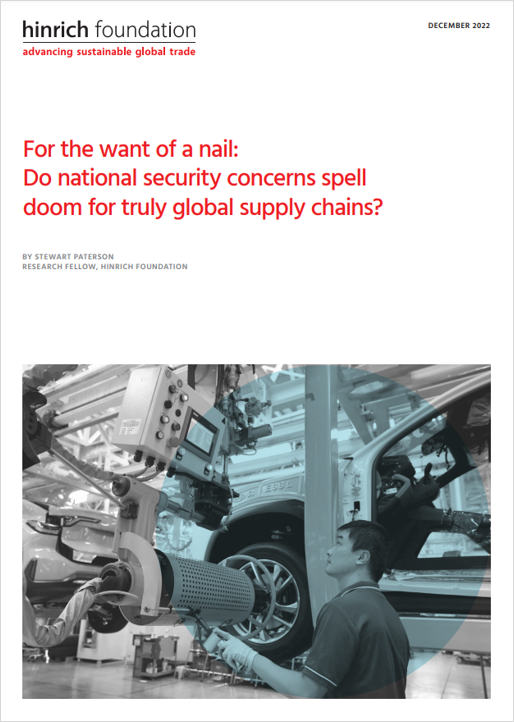Trade and geopolitics
Do national security concerns spell doom for truly global supply chains?
Published 14 December 2022
The wide gap in objectives on reducing trade dependencies on China suggests that greater multilateral cooperation in building supply chain resilience may not be forthcoming. But as the economic cost of a fragmenting geopolitical situation continues to rise, a targeted and coordinated strategy will stand a greater chance of success than wholesale decoupling.
As manufacturing activity has become increasingly concentrated in China, there has been a renewed focus on the trade dependencies that China’s economic rise has produced and their potential for weaponization. Various countries have instigated industrial policies in response to their concerns over supply chain resilience, but this phenomenon also spurs a lack of multilateral cooperation. This reflects to some extent the absence of trust in the global trading system but also the differing views as to the reasons and the degree of need to diversify away from China.
Emerging from these mixed positions is an order of priorities in monitoring and regulating commercial relations with the world's second largest economy. In this final installment of a Hinrich Foundation series on trade dependency, Research Fellow Stewart Paterson examines the overall level of economic exchange between China and the rest of the world and clinical or critical trade dependencies that could be weaponized to great effect. Paterson notes that if those who wish to limit China’s influence on the world order are to immunize themselves from the impact of China’s economic statecraft, then the hierarchy of trade dependencies must be addressed or reconciled.
Download Do national security concerns spell doom for truly global supply chains? by Stewart Paterson:
Download the other papers in the Hinrich Foundation series on trade dependency:
© The Hinrich Foundation. See our website Terms and conditions for our copyright and reprint policy. All statements of fact and the views, conclusions and recommendations expressed in this publication are the sole responsibility of the author(s).
Stewart Paterson is a Senior Research Fellow at the Hinrich Foundation who spent 25 years in capital markets as an equity researcher, strategist and fund manager, working for Credit Suisse, CLSA and most recently, as a Partner and Portfolio Manager of Tiburon Partners LLP.
Have any feedback on this article?
Related Articles

Strategic reglobalization: Great power rivalry comes for the multilateral trading system
26 October 2022

Strategic reglobalization: Great power rivalry comes for the multilateral trading system
26 October 2022

Strategic reglobalization: Great power rivalry comes for the multilateral trading system
26 October 2022





